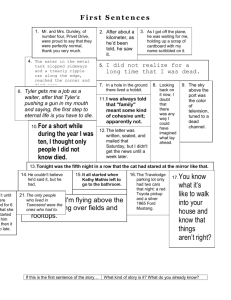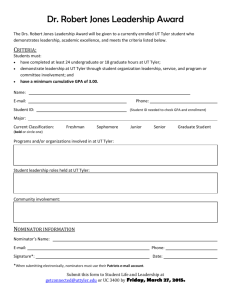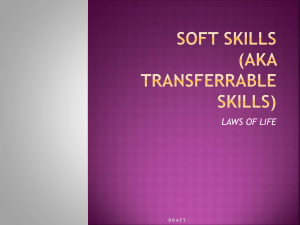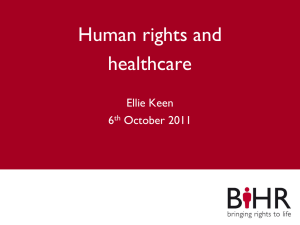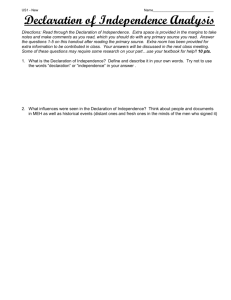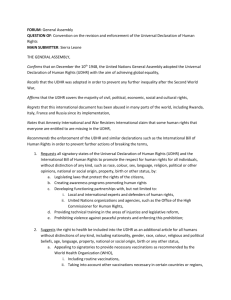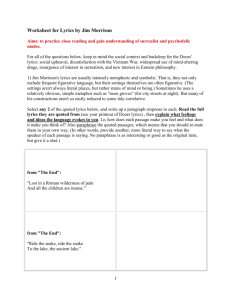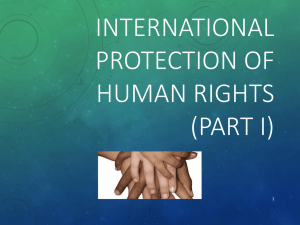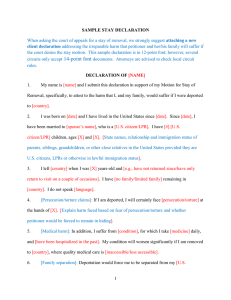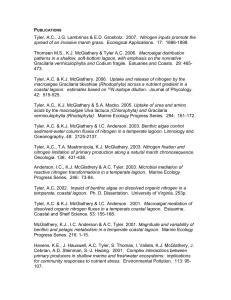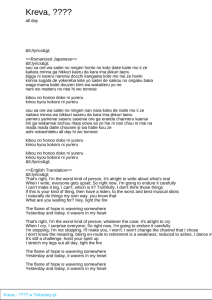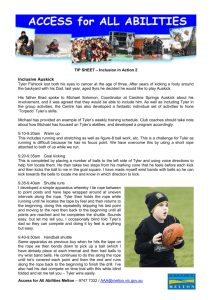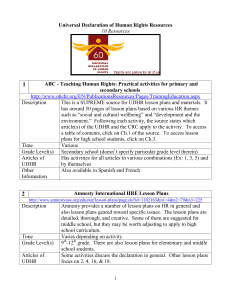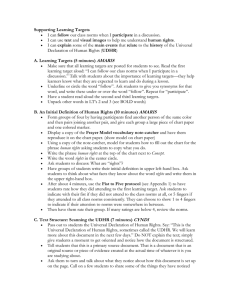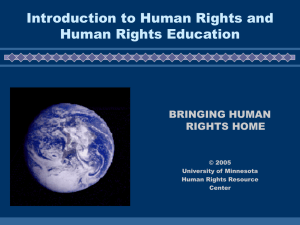Report - egmun
advertisement
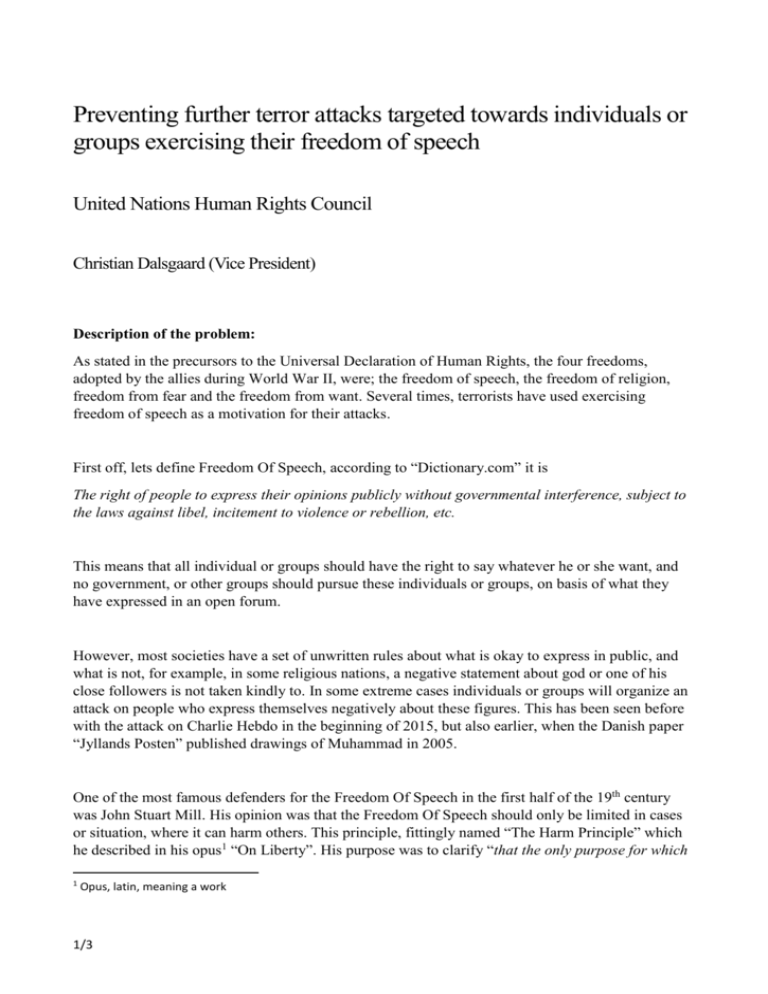
Preventing further terror attacks targeted towards individuals or groups exercising their freedom of speech United Nations Human Rights Council Christian Dalsgaard (Vice President) Description of the problem: As stated in the precursors to the Universal Declaration of Human Rights, the four freedoms, adopted by the allies during World War II, were; the freedom of speech, the freedom of religion, freedom from fear and the freedom from want. Several times, terrorists have used exercising freedom of speech as a motivation for their attacks. First off, lets define Freedom Of Speech, according to “Dictionary.com” it is The right of people to express their opinions publicly without governmental interference, subject to the laws against libel, incitement to violence or rebellion, etc. This means that all individual or groups should have the right to say whatever he or she want, and no government, or other groups should pursue these individuals or groups, on basis of what they have expressed in an open forum. However, most societies have a set of unwritten rules about what is okay to express in public, and what is not, for example, in some religious nations, a negative statement about god or one of his close followers is not taken kindly to. In some extreme cases individuals or groups will organize an attack on people who express themselves negatively about these figures. This has been seen before with the attack on Charlie Hebdo in the beginning of 2015, but also earlier, when the Danish paper “Jyllands Posten” published drawings of Muhammad in 2005. One of the most famous defenders for the Freedom Of Speech in the first half of the 19th century was John Stuart Mill. His opinion was that the Freedom Of Speech should only be limited in cases or situation, where it can harm others. This principle, fittingly named “The Harm Principle” which he described in his opus1 “On Liberty”. His purpose was to clarify “that the only purpose for which 1 Opus, latin, meaning a work 1/3 power can be rightfully exercised over any member of a civilized community against his will is to prevent harm to others” History of the topic: Freedom Of Speech has a long history, and can be dated as far back as 399 BC, when Socrates said to the jury at his trial “If you offered to let me off this time on condition I am not any longer to speak my mind... I should say to you, "Men of Athens, I shall obey the Gods rather than you”. Some time after this incident, in 1633, Galileo Galilei was hauled before the inquisition for claiming that the Earth revolved around the sun, and not the other way around, as thought in that time. Similar cases where scientist got put on trial for publishing their findings, because they contradicted what was thought at the time. In 1689 the Britsih passed “The Bill Of Rights”, granting Freedom of Speech in the parliament, so no matter of what MP’s2 said, they could not be prosecuted for this. During the French Revolution the Declaration of the Right of Man of other Citizen was adopted, and in this, article 11 stated “the free communication of ideas and opinions is one of the most precious of the rights of man. Every citizen may, accordingly, speak, write, and print with freedom, but shall be responsible for such abuses of this freedom as shall be defined by law”. Around the same time as this, the United States were working on their own “Bill of Rights”, where the first amendment stated “Congress shall make no law respecting an establishment of religion, or prohibiting the free exercise thereof; or abridging the freedom of speech, or of the press; or the right of the people peaceably to assemble, and to petition the Government for a redress of grievances”. Previous UN actions In 1948, the United Nations adopted the Universal Declaration of Human Rights, in short UDHR, where article 18 states “everyone has the right to freedom of thought, conscience and religion; this right includes freedom to change his religion or belief, and freedom, either alone or in community with others and in public or private, to manifest his religion or belief in teaching, practice, worship and observance.” And article 19 states “Everyone has the right to freedom of opinion and expression; this right includes freedom to hold opinions without interference and to seek, receive and impart information and ideas through any media and regardless of frontiers.” Current day A vast majority of all nations have laws protecting freedom of speech, or laws preventing prosecution of individuals who express themselves. However, some nations have banned individuals from entering, due to statements by them. Let us look at Tyler, the Creator, as an example. In late August this year he was banned from the United Kingdom for 3-5 years for lyrics he wrote in 2009. In the official letter from the UK it stated “Your albums Bastard, in 2009, and Goblin, in 2011, are based on the premise of your adopting a mentally unstable alter ego who describes violent physical abuse, rape and murder in graphic terms which appears to glamourize this 2 MP, shortning, meaing Members of Parliment 2/3 behavior.” Tyler and his producer have since protested by stating that these lyrics are old and he has matured since then and he has made multiple visits to the UK since 2009. So is it okay for a Nation to ban an artist, because of old lyrics? The UK is not the first nation to ban Tyler, earlier the same summer, Australia. Should certain laws be made concerning art, and what artists are allowed to say? Questions to research: What are the current laws of you country concerning Freedom of Speech? Has your country been subject to attack on basis of Freedom Of Speech? If so, how did it act following the attack? Should restrictions be imposed in regards to not offending any religion? Sources: http://harvardnsj.org/wp-content/uploads/2015/01/Vol.-2_Barak-Erez_and_Scharia_Final.pdf http://dictionary.reference.com/browse/freedom+of+speech http://plato.stanford.edu/entries/freedom-speech/#HarPriFreSpe http://www.un.org/en/documents/udhr/index.shtml#a1 https://www.liberty-human-rights.org.uk/human-rights/free-speech-and-protest/speech-offences http://thephuckery.tumblr.com/post/127650317172/tyler-uk 3/3
